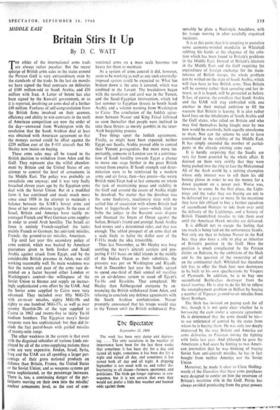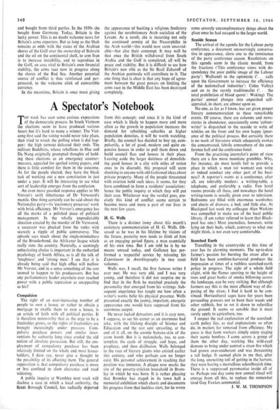Britain Stirs It Up
MIDDLE EAST
By D. C. WATT
THE ethics of the international arms trade are always rather peculiar. But the recent splurge of British arms sales in the states around the Persian Gulf is very extraordinary even by the standards of the trade. In the last six months we have signed the final contracts on deliveries of 1100 million-odd to Saudi Arabia, and £36 million with Iran. A Letter of Intent has also been signed by the Kuwaiti government, or so it is reported, involving an arms deal of a further £40 million. Fanfares of self-congratulation from the British firms involved on their acumen, efficiency and ability to win contracts in the teeth of American competition are now the order of the day—answered from Washington with the revelation that the Saudi Arabian deal at least was obtained with American agreement so that the moneys earned could be offset against the £259 million cost of the F-111 aircraft that Mr Healey now insists on buying.
These arms sales may all be traced to the British decision to withdraw from Aden and the Gulf. They represent also the wilful abandon- ment by Britain and the United States of any attempt to control the level of armaments in the Middle East. The policy was probably an unrealistic one anyway; and it was very badly breached eleven years ago by the Egyptian arms deal with the Soviet Union. But in a modified form it has continued and made much more sense since 1958 in the attempt to maintain a balance between the UAR's Soviet arms and those of her most obvious targets. In the case of Israel, Britain and America have tacitly en- couraged French and West German arms supplies in order to avoid Arab hostility. The Israeli air force is entirely French-supplied; the tanks mainly French or German; the anti-tank missiles, French; the ground-to-air missiles, American.
Up until last year this secondary policy of arms control, which was backed by American guarantees given to both Jordan and Saudi Arabia against attack from Egypt, and by the considerable British presence in Aden, was still working reasonably well. Its main weakness was that the nature and pace of the arms race de- pended on a factor beyond either London or Washington's control—the willingness of the Soviet Union to finance and supply an increas- ingly sophisticated arms effort by the UAR. And the Soviet arms supplied to Cairo were very advanced. They included over fifty MiG-21s with air-to-air missiles, eighty MiG-19s and eighty to one hundred MiG-17s, as well as over seventy Ilyushin-28s of the type supplied to Castro in 1962 and twenty-five to thirty Tu-16 medium bombers. The Egyptian navy's Soviet weapons were less sophisticated; but they did in- clude the fast patrol-boats with guided missiles of twenty-mile range.
The other weakness in the system is that even with the disguised subsidies of various kinds em- ployed by all of the arms-supplying nations these arms are very expensive. Jordan, Israel, Syria, Iraq and the UAR are all spending a larger per- centage of their gross national products on defence than Britain, France, the United States or the Soviet Union; and as weapons systems get more sophisticated, so the percentage increases. There is, too, a continuing danger of the par- ticipants moving on their own into the missile/ nuclear armaments level, as the cost of con- ventional arms on a mass scale becomes too heavy for them to maintain.
As a system of arms control it did, however, seem to be working as well as any such externally- imposed system could be expected to. What has broken down is the area it covered, which was confined to the Levant. The breakdown began with the revolution and civil war in the Yemen, and the Saudi-Egyptian intervention, which led last summer to Egyptian threats to bomb Saudi Arabia and a solemn warning from Washington to Cairo. The conclusion of the Jeddah agree- ment between Nasser and King Feisal followed so soon thereafter that people were inclined to take these threats as merely gambits in the inter- Arab bargaining process.
Two things upset the Jeddah agreements. Firstly, as might have been expected, neither Egypt nor Saudia Arabia proved able to control their Yemeni protagonists. But more more im- portantly, someone in London saw in a continua- tion of Saudi hostility towards Egypt a chance to move one stage further in the great British retreat from empire. If Saudi strength and deter- mination were to be reinforced by a modern army and air force, then—hey presto—the weary British mini-Titan had at last someone on whom the task of maintaining peace and stability in the Gulf and around the coasts of Arabia might be devolved. No matter that the devolvee was the same feudatory, reactionary state with no settled line of succession with whom Britain had been at loggerheads for years—which tried to bribe the judges in the Buraimi oasis dispute and financed the Imam of Oman against the Sultan, Britain's friend and protégé. Saudi Arabia had money and a determined ruler, and that was enough. The added prospect of an arms deal on a scale likely to halve the dollar cost of the F-111s made the idea irresistible.
Thus last November, as Mr Healey was busy scuttling the navy's aircraft carriers and pro- jecting F-111 bases on tidal islands in the middle of the Indian Ocean as their substitute, the pressure was put on Washington and Riyadh. And in December last year the Saudis agreed to spend one-third of their annual oil royalties on an air-defence system to stand off Egypt's Tu-16s and Ilyushins. That completed, Mr Healey then flabbergasted everyone by an- nouncing the British withdrawal from Aden, and refusing to conclude any defence agreements with the South Arabian confederation. Nasser promptly announced that his troops would stay in the Yemen until the British withdrawal. Pre- sumably he plans a Nazi-style Anschluss, with his troops moving in after carefully organised incidents.
It is at this point that it is tempting to postulate some economy-minded mandarin in Whitehall rubbing his hands at the elegance of the solu- tion which has been found to Britain's problems in the Middle East. Instead of Britain's interests in the Middle East and the Gulf requiring the expenditure of foreign exchange for the main- tenance of British troops, the whole problem can be wished on the state of Saudi Arabia, which will then have to buy British arms. Thus Britain will be earning rather than spending and her in- terest, so it is hoped, will be protected as before. It has, of course, the corollary that Saudi Arabia and the UAR will stay embroiled with one another in their mutual ambition to fill the vacuum that Britain is leaving. It is also rather hard lines on the inhabitants of South Arabia and the Gulf states, who relied on Britain and who may find themselves being fought over by two new would-be overlords, both equally unwelcome to them. Nor can the scheme be said to have contributed to the stability of the Middle East. It has simply extended the number of partici- pants in the already existing arms race.
It is hardly surprising that the Saudis are very far from gruntled by the whole affair. It dawned on them very swiftly that they were being pushed into the ring to face the Muhammad Ali of the Arab world by a retiring champion whose only interest was to sell them his old boxing gloves in order to use the money for a down payment on a newer pair. Worse was, however, to come. In the first place, the Light- nings and the radar they are buying are not to be delivered for a year or more. In the meantime they have felt obliged to buy a further squadron of secondhand Hunters to tide them over until the delivery of the Lightnings, and a battery of British Thunderbird missiles to tide them over until the American Hawk missiles are delivered.
It is difficult not to escape the feeling that too much is being laid on the unfortunate Saudis. Not only are they to balance Nasser in the Red Sea; they also have a role to play as inheritor of Britain's position in the Gulf. Here the position is much complicated by the Persian claims on Bahrain, by the ambitions of the Shah and by the question of the ownership of oil on the continental shelf. Whitehall has therefore felt free to offer the Shah four new destroyers to be built to his own specifications by Vospers of Plymouth. In addition, he is to buy one secondhand Battle-class destroyer from the naval reserves. He is also to do his bit to relieve the unemployment problem in Belfast by buying a number of Tigercat ground-to-air missiles from Short Brothers.
The Shah has insisted on paying cash for all this, though it is not quite clear whether he is borrowing the cash under a separate agreement.
He is determined that the arms should be his—
to use unfettered of control by the states from whom he is buying them. He was only too deeply impressed by the way Britain and America cut arms deliveries to Pakistan during the fighting with India last year. And although he gave the Americans a bad scare by hinting to two Ameri- can journalists that he was thinking of buying Soviet Sam anti-aircraft missiles, he has in fact bought from neither America nor the Soviet Union.
,Moreover, he made it clear to Clare Holling- worth of the Guardian that these arms purchases
were designed to confer on him the reversion of Britain's maritime role in the Gulf. Persia has always avoided purchasing from the great powers
and bought from third parties. In the 1930s she bought from Germany. Today, Britain is the lucky power. This is no doubt welcome news for Britain's arms exporters. But as long as the Shah remains at odds with the states of the Arabian shores of the Gulf over the ownership of Bahrain and the oil on the continental shelf, to arm Iran is to increase instability, and to reproduce in the Gulf, an area vital to Britain's own financial stability, the arms race now in progress along the shores of the Red Sea. Another potential source of conflict is thus reinforced and per- petuated, to the welcome clink of convertible currency.
In the meantime, Britain is once more giving the appearance of backing a religious feudatory against the revolutionary Arab socialists of the Levant. As a result, she is incurring not only the continued enmity of the Nasserphiles in the Arab world—this would now seem unavoid- able—but also their contempt. It may well be that once the British withdrawal from South Arabia and the Gulf is completed, all will be peace and stability. But it is difficult to see how Britain's new role as the Sir Basil Zaharoff of the Arabian peninsula will contribute to it. The one thing that is clear is that any hope of agree- ment between the great powers on limiting the arms race in the Middle East has been destroyed completely.



































 Previous page
Previous page